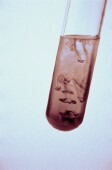Biomarker May Predict Response to Cancer Therapy
Dutch researchers identify cell type that is potential target for these agents.
|
E-mail this article
Subscribe to news
Printer friendly version
|

(SOURCE: American Association for Cancer Research, news release, April 13, 2008)
SUNDAY, April 13 (HealthDay News) -- A biomarker that may help doctors monitor the effectiveness of common treatments for kidney cancer and non-small cell lung cancer has been identified by researchers in the Netherlands.
The researchers found that CD34bright/CD133neg candidate circulating Endothelial Progenitor Cells (ccEPCs) are a potential biomarker during treatment with sunitinib (Sutent) or bevacizumab (Avastin).
"Our work provides novel data on a potential biomarker for the monitoring of anti-angiogenic drug activity in cancer patients, as well as identifies a cell type that is a potential target for these agents," Laura Vroling, a researcher in the department of medical oncology at VU University Medical Center in Amsterdam, said in a prepared statement.
Vroling and her colleagues noted that bevacizumab and sunitinib, which target the vascular endothelial growth factor (VEGF), have proven effective against a number of cancers, but doctors aren't able to determine which patients might derive the most benefit from these drugs.
"Therefore, it is of great importance to identify and validate biomarkers for early response or duration of response," Vroling said.
She and her team studied 23 patients with renal cell cancer and 19 patients with non-small cell lung cancer.
"In our study, for the first time, the behavior of two CD34bright cell populations, (CD45neg) candidate cEPcs and (CD45dim) HPCs (hematopoietic progenitor cells), were monitored and showed a different response of both cell populations during sunitinib or bevacizumab therapy. The role of ccEPCs in human tumor angiogenesis and their potential in prediction of treatment outcome of anti-VEGF therapy needs to be addressed in future, larger clinical cohorts," Vroling said.
The study findings were to be presented Sunday at the annual meeting of the American Association for Cancer Research, in San Diego.
More information
The National Academies Press has more about cancer biomarkers. 
Copyright © 2008 ScoutNews, LLC. All rights reserved. 
HealthDayNews articles are derived from various sources and do not reflect federal policy. healthfinder.gov does not endorse opinions, products, or services that may appear in news stories. For more information on health topics in the news, visit the healthfinder.gov health library.